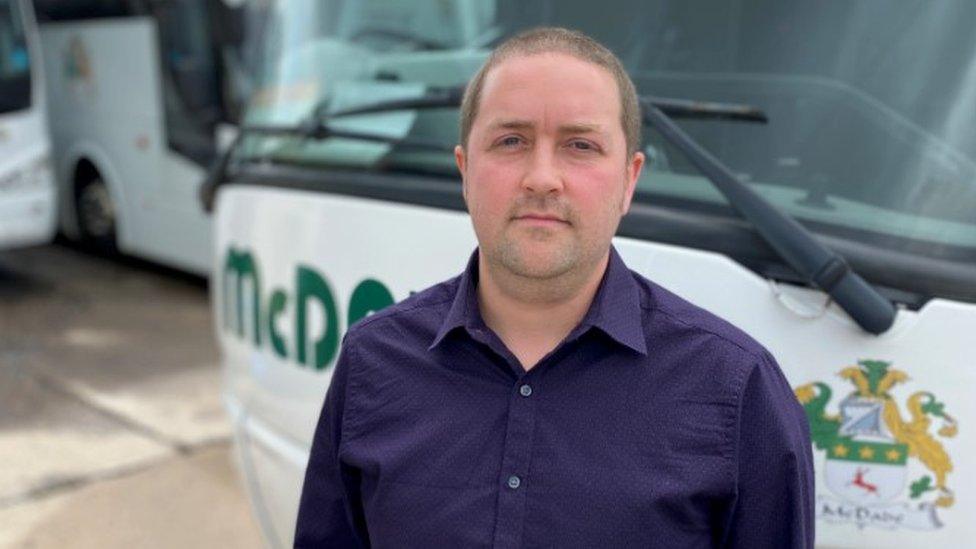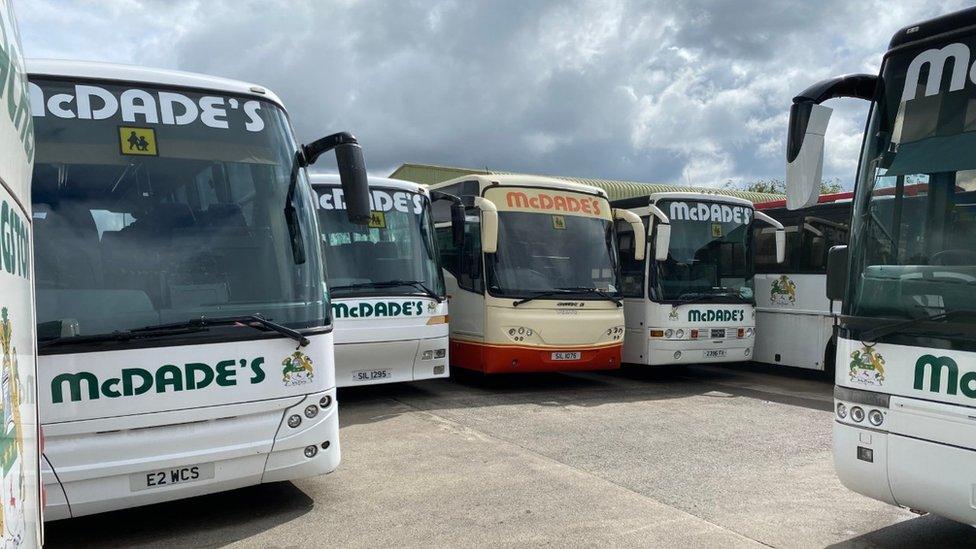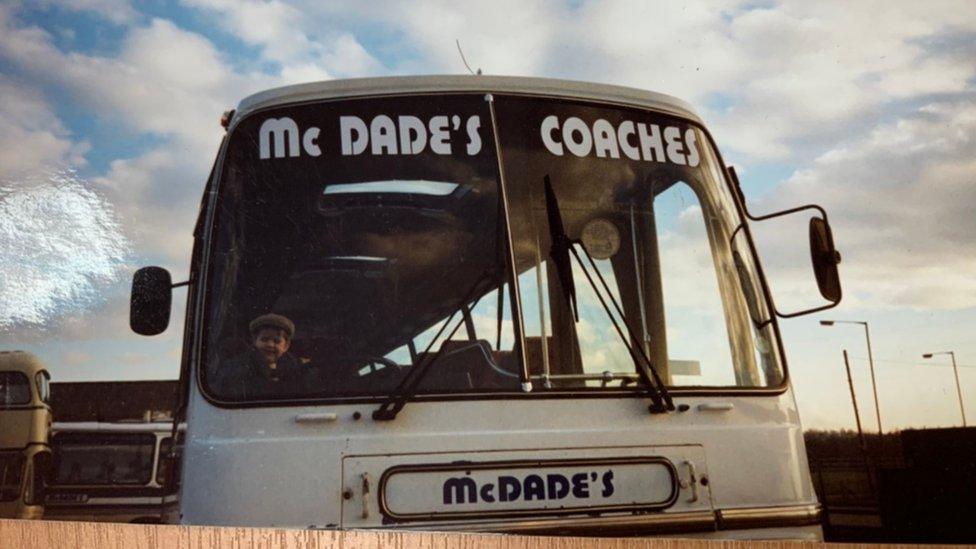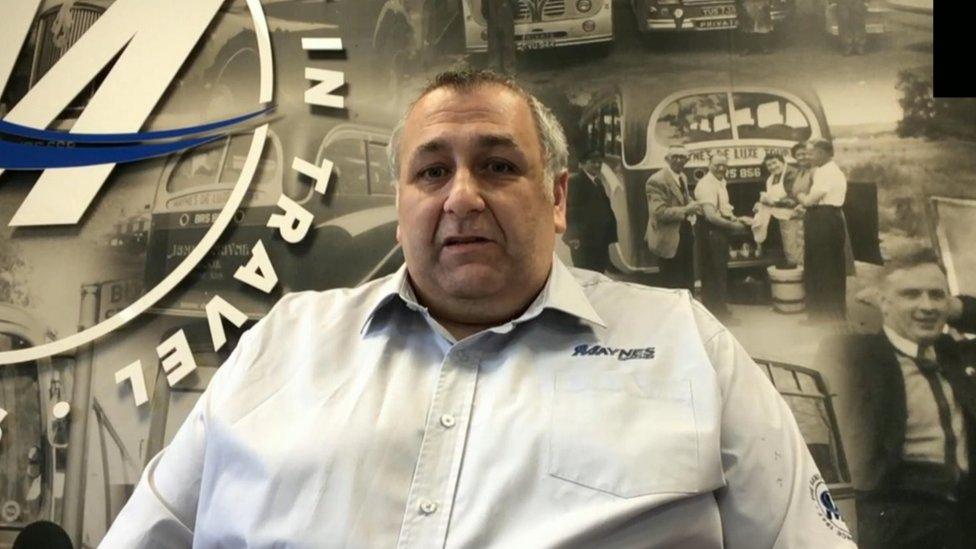Coronavirus: Coach firms facing 'impossible choices'
- Published

Andy McDade says it's going to be incredibly difficult for the coach industry to survive
Andy McDade, who runs a Lanarkshire coach firm established by his father almost 40 years ago, says surviving the winter is going to be incredibly difficult.
McDade's Coaches, like many similar firms across Scotland, is facing "almost impossible choices" as it struggles to deal with the impact of the coronavirus outbreak.
He told BBC Scotland's The Nine he will have to turn down a council payment for school transport contracts in order to keep his staff employed using the furlough scheme.
"Everyone in the coaching industry jokes that it's in their blood," says Andy.
"That is very much true. In the main, we are family-run businesses - second and third generation right up and down the country."
The 32-year-old has been running his family business for six years. In the depot's office, he shows photos of himself as a toddler at the wheel of a McDade's coach and a picture of his father with staff in 1995, some of whom are still employed by the firm.
Since mid-March, he is the only one of 39 people at the company who has not been furloughed.
All of his 30-plus vehicles have been declared off the road and are crammed into his yard in Uddingston, South Lanarkshire.
'Between a rock and a hard place'
"We see the majority of private hire income in the months of June, July and August - up to 50% for some operators.
"So to lose that money, and go into another winter, it is going to be incredibly difficult for the industry to survive."

McDade's vehicles are currently declared off the road and are in the firms's yard in Uddingston
Football traffic and day trips have stopped and at the moment pupils no longer need to be shuttled to school due to Covid-19.
With the private hire and summer business gone, the only sources of income for McDade's are its home-to-school contracts with North and South Lanarkshire councils. Both councils have agreed to pay him 75% of the usual instalments.
But McDade's Coaches were also told by North Lanarkshire they can only access the money if they have not furloughed staff.
The firm needs the council money to continue paying "massive overheads" including maintenance costs.
However, with about 40% of the firm's income coming from private hires, it also needs the furlough scheme to keep paying staff.
Andy says: "We are stuck between a rock and a hard place, a catch-22.
"With our outgoings that we would run alongside our wage roll, we couldn't survive on just that 75% payment.
"So we will have to forego that payment from North Lanarkshire Council to enable us to keep our staff employed and on the furlough scheme. We have no work for them and no prospect of work in the near future."

Many of Scotland's coach firms are family-run businesses handed down over generations
He believes companies in Lanarkshire will "fail faster and more frequently than in other parts of the country".
And he says if firms disappear, then those that survive won't be able to "pick up the slack" of next year's school contracts.
"I know that I'm not going to be investing in any new vehicles in the next 12 months - the uncertainty is too much to go out and take on any more debt," he adds.
It is a problem facing many of the 200 coach firms across Scotland which employ about 4,000 people. About 98% of coaches in Scotland are currently declared off the road.
With the majority of summer income coming from private hires, the industry is forced to rely on reduced payments from councils.
Some councils, such as Aberdeenshire, have agreed to pay contracts in full until they expire in June.
Some have requested access to companies' accounts, to ensure firms are not benefiting from government funding.
Others, such as North Lanarkshire and Edinburgh, have said that furlough payments would affect whether a firm receives any money at all.
'Total industry collapse'
It is not the only issue facing the industry.
Maynes of Buckie has operated in Moray since 1947. The bulk of its income is from tourism but some money also comes from its contracts with the local council.
Director Kevin Mayne says many smaller firms could disappear once school contracts end in June.
He says: "The dangers are a total industry collapse. The coach industry is currently at a cliff edge.
"There have been a lot of grants bandied around for the bus industry. But the coach industry hasn't been able to touch any of that."

Kevin Mayne says many smaller firms could disappear once school contracts end in June
Maynes of Buckie has managed to access the £25,000 grant introduced by the Scottish government to help firms in the hospitality and tourism industries.
However, the Confederation of Passenger Transport (CPT) Scotland - a trade association representing bus and coach companies - says nearly a quarter of its members have been turned down for the grant.
Paul White, CPT Scotland director, says there needs to be specific support for the coach industry.
This may include a "mothball" payment to pay for vehicles currently off the road.
He says: "Coach falls between the cracks slightly.
"It doesn't qualify for the support available for the bus sector and it has been regularly refused support that is available for the tourism sector.
"It finds itself facing a wipe-out of this summer season and little support to enable them to survive for a tourism pick-up in 2021."
The Scottish government says its support for business now stands at £2.3bn, including 1.6% rates relief for all non-domestic properties in 2020-21, a £10,000 Small Business Grant Fund and a £25,000 Retail, Hospitality and Leisure Grant Fund.
A spokesman added: "Local authorities are responsible for determining local arrangements for payments on home to school transport and we expect them to treat their contractors fairly."

A SIMPLE GUIDE: How do I protect myself?
LOOK-UP TOOL: Check cases in your area
MAPS AND CHARTS: Visual guide to the outbreak
